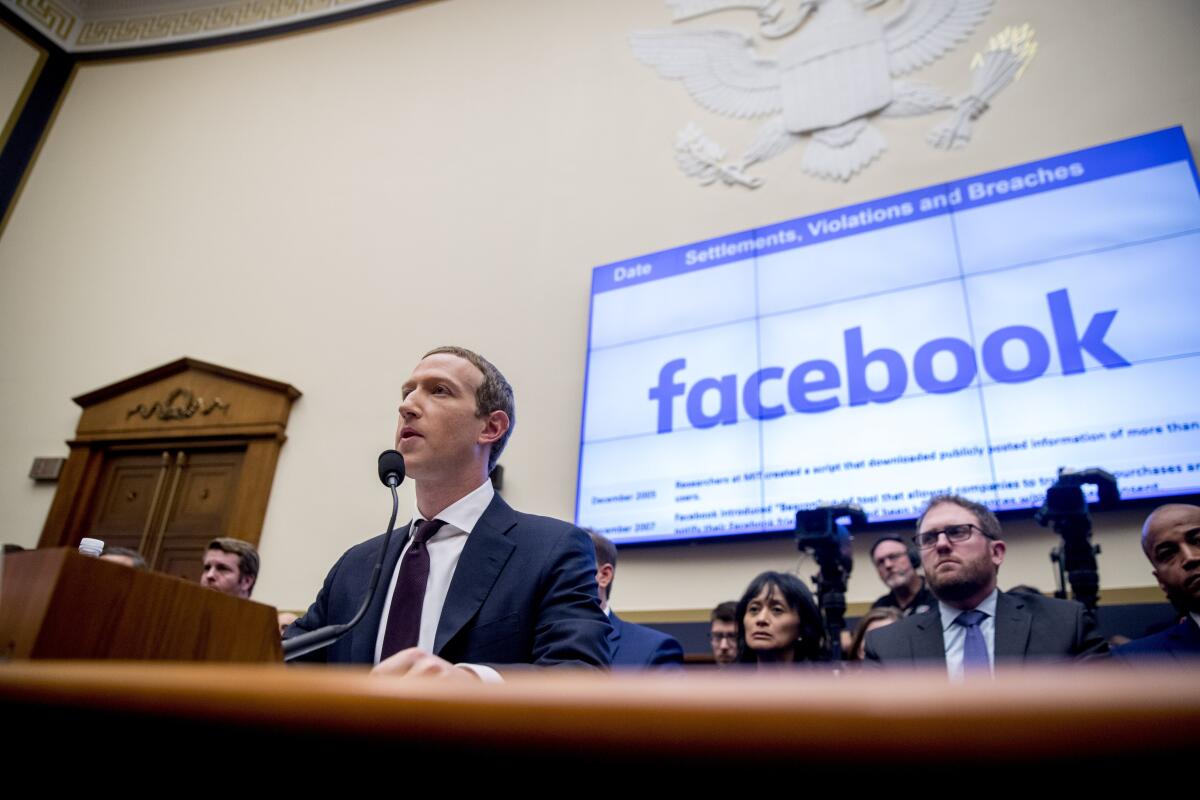‘It’s not going away.’ Pressure on Facebook likely to continue under Biden administration

- Share via
Coming on the tail end of President Trump’s administration, the lawsuits against Facebook announced Wednesday by the Federal Trade Commission and 46 states and districts might seem like the last angry quack of a lame duck who’s harbored a long-running grievance against social media executives.
But the breadth of the bipartisan coalition bringing forward the suits, which allege anti-competitive practices by Facebook and seek to undo its acquisitions of Instagram and WhatsApp, suggests this fight will continue well past Trump’s last day in office.
The participation of nearly every Democratic attorney general in the country suggests the incoming administration of President-elect Joe Biden will press on with the suits, said Gigi Sohn, a distinguished fellow at the Georgetown Law Institute for Technology Law and Policy.
“It’s not going away,” she said.
Herbert Hovenkamp, an antitrust policy expert and professor at University of Pennsylvania’s Carey Law School, agreed.
“The loudest cries against the big platforms have come from Democrats historically, so the fact that these lawsuits are starting out in a Republican administration I think bodes poorly for them because they’re not going to get a lot of political relief from Congress,” Hovenkamp said.
Unlike some of his rivals for the Democratic nomination, Biden didn’t make tech policy a focus of his campaign, leaving uncertain how he plans to deal with the concentration of economic and political power in the hands of Amazon, Apple, Facebook, Google and Microsoft. Some experts predict more active trust-busting, and Biden has indicated openness to that approach: In 2019, he told the Associated Press that breaking up Facebook “is something we should take a really hard look at.”
Where President Obama had a warm relationship with Silicon Valley, Biden’s tone has been less cordial. In a preelection interview with the New York Times, he called tech leaders “little creeps” and criticized the industry for its “overwhelming arrogance.”
In the same discussion, he called for a repeal of Section 230 — the law protecting social media platforms’ right to moderate user-generated content and shielding them from liability for it — and suggested support for an active government role in regulating the internet.
“In every other revolution that we’ve had technologically, it’s taken somewhere between six years and a generation for a government to come in and level the playing field again,” Biden said. The internet today presents the same challenges, he said, “and it’s a responsibility of government to make sure it is not abused.”
Early moves Biden has made in staffing up his administration, however, have portended a cozier relationship with Big Tech.
Biden’s transition team includes employees from a long list of tech companies, including Amazon, Airbnb, Microsoft and Uber; these appointees won’t necessarily stay on past the inauguration but will have a hand in choosing who does. Google’s former executive chairman, Eric Schmidt, has reportedly held discussions about leading a new White House task force on technology.
With Trump using his bully pulpit to rail against alleged monopolies in the tech sector, the laissez-faire consensus of the Obama years has given way in both parties to a shared sense that the power of the tech giants must be addressed — even if the two sides disagree about what that means.
Liberals have criticized digital information platforms, in particular Facebook, for spreading misinformation, promoting hate speech and giving foreign adversaries influence over U.S. elections. Conservatives have advanced the idea that internet platforms censor voices from the right (a claim Facebook’s own data contradicts).
After a bipartisan hearing by the House antitrust committee in July, Democrats and Republicans released separate reports on the state of tech-industry consolidation. Despite the split, the Republican version still found common ground with the Democrats in concluding that “Apple, Amazon, Google, and Facebook have used their monopoly power to act as gatekeepers to the marketplace, undermine potential competition, and pick winners and losers.”
In February, the FTC began seeking information about potentially anti-competitive acquisitions undertaken by Facebook, Google, Apple, Amazon and Microsoft over the last decade; the Justice Department opened a similar investigation in July 2019.
Tech leaders — including Facebook Chief Executive Mark Zuckerberg — have been called before Congress repeatedly so Republican lawmakers could accuse them of silencing conservative voices online, with this summer’s crackdown on a New York Post story critical of then-candidate Biden prompting loud outrage. Trump himself has been an avid critic of the major social media platforms, often using the very platforms he was criticizing to call for an end to Section 230.
But where Trump’s attempt to modify Section 230 via executive order hinged on a questionable interpretation of the law, antitrust experts see the case against Facebook as solid.
“Facebook will be broken up, but it’ll take a few years for the case to wind its way through the court,” said Matt Stoller, author of “Goliath: The Hundred Year War Between Monopoly Power and Democracy.” “The evidence in here is damning.”
Sohn agreed.
“This was a well-investigated, well-considered, well-thought-out position by the Federal Trade Commission,” she said. The antitrust concerns raised and the breadth of support behind it make the case “a lot bigger than Trumpism.”
Times staff writers Johana Bhuiyan and Suhauna Hussain contributed to this report.







